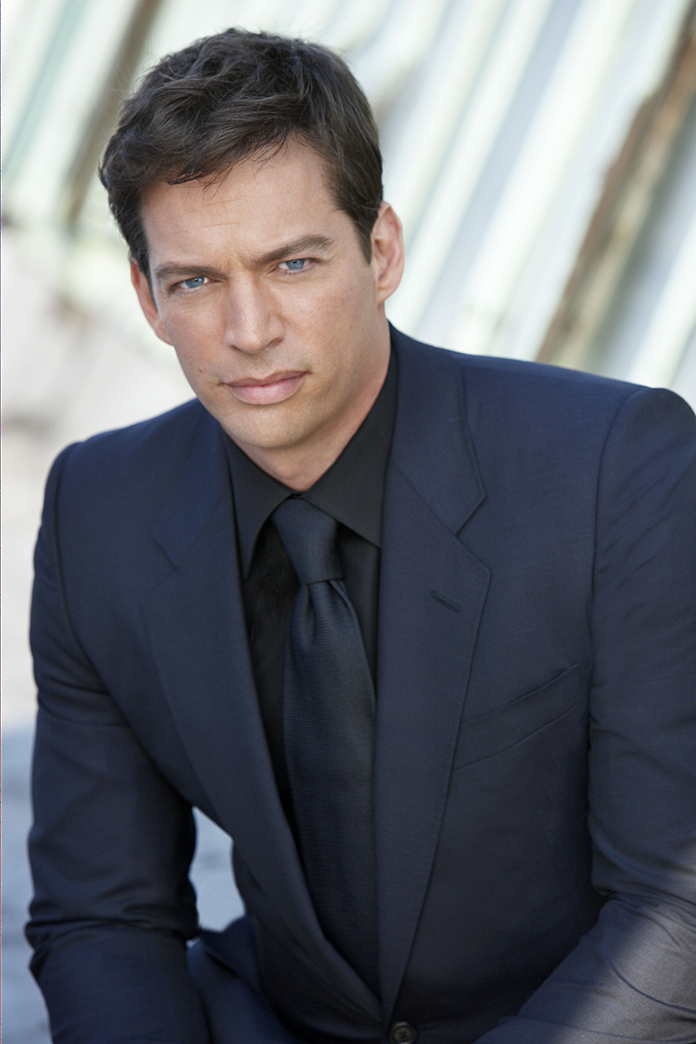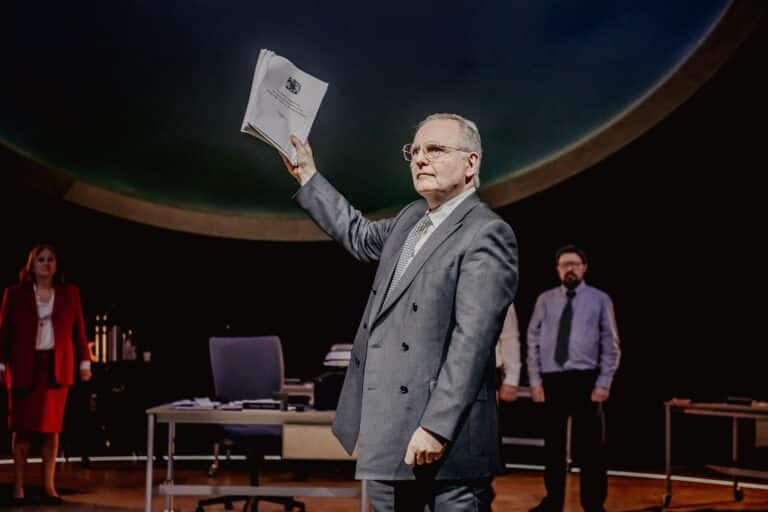The New Orleans, LA, native and New Canaan, CT, resident has recorded more than 40 albums. His newest, Every Man Should Know, is his most personal to date. The award-winning musician, actor and family man talks exclusively to Serendipity about what he’s learned in his many roles.
Harry Connick, Jr., is a busy man. He’s a pianist, singer, composer, actor, band leader, Broadway star, avid philanthropist and, just recently, a mentor on American Idol. Luckily, he can recharge at home in New Canaan, where he’s lived for close to 15 years with his wife, Jill Goodacre, and their three daughters. It’s also where Connick wrote much of the music, lyrics and arrangements for his newest album, Every Man Should Know, which features 12 original and very personal songs. “I don’t recall ever reaching quite as deeply — or confidently — into my inhibition pool,” he says.
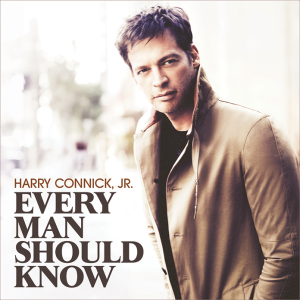
What inspired the title Every Man Should Know?
This song came out of inadequacy. We had this handyman George and we were building a workbench. I asked if I could help, and he said yes begrudgingly because he knew I wasn’t really going to be able to do anything except hold the bag of nails. It came time to sand and I even did that wrong! Then I thought of all the other things I can’t do — it doesn’t go unnoticed that [my wife] Jill doesn’t ask me to do things around the house. I started thinking of all the basic things a guy should know how to do.
But I do know how to love my wife and I know how to care for her. There’s a line in the song: ‘Every man should recognize what she’s saying with her eyes and help with her burdens to bear.’ I’m good at that. I can look at Jill and see what’s going on. That’s the secret to a good marriage, I think. It’s great if you find them attractive and funny, but ultimately if you don’t care about them it’s going to fall apart. If you’re going to put a ring on someone’s finger, you should know how to care.
Did you learn how to care from your own parent’s relationship?
I just saw them do it. I remember sitting at the dinner table; my mother [Anita] was a judge and my dad [Harry, Sr.] was a district attorney and they would discuss cases. They would talk about their day. I saw their connection and that they were interested in each other. That had to have had an impact on me.
You have said this album is your most personal ever. Did age and experience lead you here?
Probably. I’ve made more than 40 records and I’ve made references to Jill, but I’m very private. I’ve never wanted to sing about personal stuff before, but when you do 40 records, there comes a time when you’re willing to do it. As I get older, I’m starting to put myself out there more.
There’s one song on the new album called ‘Come See About Me,’ which is actually the hardest one to sing, and it’s about a guy whose girl has left and moved on, and he knows she’s with somebody else. The first line is, ‘I don’t want to bother you, but Baby, come see about me,’ and that came from a thought I had about Jill, and how I’d feel if I passed a restaurant in New York City and saw her laughing with another guy. I don’t know if I could stand it. I asked her, ‘I’ve never sung such personal songs before, how can I go on stage and do this?’ Jill said she thinks after I sing them a few times, I’ll get used to where the emotional potholes are and be able to navigate them.
Is Jill someone you turn to for advice on your music?
Yes! She has a way of explaining things to me in broad terms. She may not understand the music on a technical level, but she has a barometer that’s always right. Not only about musical things, but just about life.
I was 22 when I met Jill, and I was all over the place. She has this calmness and steadiness about her that was very attractive to me. She has a moral compass that’s steady. Jill always seems able to stay the course. Even with things like tempo. I’ll record a tune and she’ll say, ‘It’s too slow,’ and I’ll be like, ‘What are you talking about?’ and then listen to it later and think ‘God, she’s right.’ It’s like an inherent knowledge. She sees all the things I would never see in a million years.
Can you tell us about the song ‘Love Wins’ that you wrote after the Newtown, CT, tragedy?
My former bandmember Jimmy Greene lost his daughter Ana Grace in the Newtown shooting. I was on the treadmill watching the news, a reporter was at the scene and thought I saw Jimmy in the background. Immediately I texted him and said ‘Please tell me you’re OK.’ He said ‘I wish I had better news. My son made it out, but my daughter did not.’
I lost it. I got in my car and I drove — I get chills thinking about it — I drove around police barricades, there were cops shining lights at me, I just had to get to his house. I did and I visited with him. It was just a complete shock.
When the funeral came he asked me if I would sing, and of course I said yes, but I didn’t know how I would be able to do it. It affected me profoundly. What I said at the funeral was that Jimmy and I are musicians, and we always say practice makes perfect. And we always ask ‘What are we practicing for?’ We’re practicing for a show, a performance. Ana Grace is at the show. She made it to the show. We’re still working on it. God must have needed her now. We’re still rehearsing. We’re gonna be there eventually. We just have to stay together until we do.
As profoundly insane as that tragedy was, love is still more powerful. Evil did not win. Love wins. Nothing can trump the power of love.
So I wrote the song ‘Love Wins’ and it was probably a $200,000 song to produce, but everyone did it for free. We had 30 gospel singers in Hartford, CT, the very next day. All of the proceeds from the song will go to Jimmy and his family.
How old were you when you first performed?
Man, I was young. The first time I played on stage I was five and it was at the New Orleans Center for Creative Arts, where Ellis Marsalis, Branford’s dad, was teaching. I remember looking up over the piano and seeing all these people clapping. I liked that. My mom took me to Washington, D.C., and there was a piano in the hotel lobby, and I asked her if I could play. Within 10 minutes people were throwing money. She made me give it all back, but I was thinking, this is easy — I can do this! I’m not a good student, I’m not a good athlete, but this I know how to do. I had to work for it, because my teachers kept telling me I wasn’t good enough and that I had to practice more. Then I hit a brick wall when I was 13. I was studying with Ellis Marsalis and he was not amused. He didn’t find me cute or interesting and did not let me think I was talented. I was a loose cannon. I was undisciplined and all over the place. My teachers would say, ‘You should quit and do something else with your life.’
They would tell my dad I could do whatever I wanted, but they wouldn’t tell me that. When I was 18 I moved to New York City and my dad asked Ellis if he thought I could make it, and he said, ‘Harry is like Secretariat looking for a race to run.’
What was it like when you got to Manhattan?
I hit another brick wall because I expected to sign with Columbia [Records]. There was a guy there named George Butler who had signed Wynton and Branford Marsalis and had met me when I was 14. He told me to call him when I made it to New York. I went to his office nearly every day for six months and he wouldn’t see me. I became really good friends with his secretary because I sat there for hours. Finally, he came into the lobby and he said he’d sign me. Man, I left that building and I ran from 54th Street to 92nd Street to the YMCA where I lived. I made my first record when I was 19. I thought I was going to be the biggest thing since sliced bread because I was so passionate. And nobody bought it. He wouldn’t let me sing on it. He said once you start singing, people are going to forget you’re a piano player. And he was right.
I did another record and I sang on it, and I thought this is going to be the one. And it sold like 10,000 units. I was still living at the Y, opening for people like Kenny G, Al Jarreau, Steven Wright, the comedian, and then I got a call from Rob Reiner to do some background piano playing for When Harry Met Sally. Not singing, just playing. Then it came time to do the soundtrack — which I was not originally on — and they had trouble getting music rights from Frank Sinatra, Ella Fitzgerald and a few of the other musicians. So Rob called me and asked if I could sing ‘It Had to Be You’ and before I knew it I had the whole record. That’s really what did it, because we sold a million records in a short amount of time. That’s when things really changed.
How did you get into acting?
I had done some plays in high school and a few commercials when I was a kid in New Orleans. I liked the idea of words conveying a meaning, because as a singer, that’s what I do. That’s what acting is, too, but there’s no music.
When I was 19, I was playing in a little club in Los Angeles, and a casting director saw me and asked me to audition for a film. It was called Memphis Belle, and I got the part. I didn’t know if I wanted to make movies, because I didn’t know what the process was like. I remember Matthew Modine, the lead in the movie who was 10 years older than me, asked if I wanted to be a big movie star. I said ‘Sure, why not?’ and he said, ‘Then stand next to me, because I’m being paid more than all of you, and they’re going to put me right in the middle of every shot. So if you want to be seen, stand next to me.’ So I did! And I just watched him. I didn’t know anything.
Were you scared when you started to embark on your acting career?
Not at all. I just didn’t know what to do. But I’ve always been kind of a con artist in that way. I’ll get in the door, and once I’m in, I’ll figure out what to do quickly. I watched what the other guys were doing, then got more auditions and offers and fell in love with it.
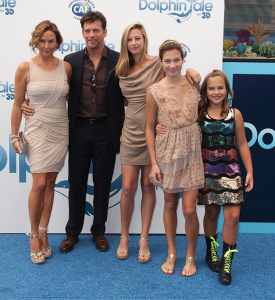
Do any of your daughters want to go into the music or acting business?
I think [my daughter] Kate does, but I have to keep reminding myself that she is not me and to not compare. Like, at first I thought they had to go through the same path that I did, but they don’t. Kate is not interested in music like I was interested in it. She likes it, but from a different angle. As parents, we have to figure out what opportunities will best suit them the way they want to go about them. I could have pushed all three of them to take singing and piano lessons, that was all I wanted to do as a kid, but it’s not necessarily what they want to do. They have other interests. Charlotte would rather do gymnastics. Kate and Georgia both write poetry. One of the challenges of being a parent is realizing that they’re not you and that they have their own personalities. The key is to provide an environment they can grow in, instead of just trying to have them emulate what you did.
Tell me about the Musicians’ Village you and Branford Marsalis helped create in 2006.
New Orleans was on the brink of losing all its culture, because Hurricane Katrina wiped out almost 80 percent of the city and everybody left. When I was a kid in New Orleans, music was very accessible, but when there are no musicians around, it’s not. Branford and I wanted to get the musicians back. We partnered with Habitat for Humanity and built 80 homes. The idea was to invite musicians back to New Orleans. Most of the homes are now occupied by musicians and their families. We built a 17,000-square-foot community center with recording facilities, performance space, dance and music classes, and kids are showing up to learn and to work. We’re trying to raise money to create an endowment to continue to operate it at the level we want.
Do you work best in a specific place or are there any writing rituals you have?
No. I’ve always felt that any kind of superstition limits you. Some people have to have a certain place to write and if they can’t be there then they can’t do it. I used to take naps before my show and I had the idea that if I don’t sleep before my show it won’t be good. I’d get really angry if I had an interview and wouldn’t be able to sleep. Then I realized that superstition was limiting me from doing what I loved to do and I stopped all of that. I can write anywhere, anytime. If you said, ‘Harry, sit down and write a song now,’ I would not get up until it happened. It’s like a water faucet.
For example, there’s a song about Jill called ‘The Greatest Love Story’ and I started thinking, What’s a story? My mother would tell me a story. So you start generating ideas like — when I was a baby lying in my bed my mother told me stories in my head. And then I think, what was that story about? Maybe it could be the mother saying, ‘Hang in there because you’re going to meet that girl one day.’ It’s a fictional concept, but it’s like giving me a fictional piece of clay and saying make something. It might not be good, but there will always be a result.
You’re touring the country promoting the album with 21 scheduled shows. Have your girls ever gone with you and will they when you head out for this album?
Yeah, yeah. Georgia, who is really talented with film and editing, is going to come out and film some of my stuff on the road. Kate has two cities that she wants to come to. I asked Charlotte the other day if she wanted to come traveling with me and she said no. And maybe Jill will come out.
How do you stay in touch with your family when you’re on the road?
I never go away for longer than a few weeks. I have this rule with the girls to please call me once a day. Just call me. Jill and I talk 20 times a day. They are all present in my life via texting or calling, and that’s really important.
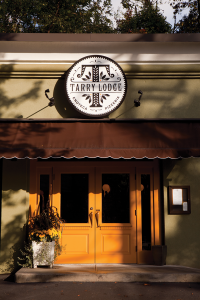
Life as a Local
Why did you and Jill decide to live in New Canaan, CT?
We got married [in 1994] and we knew we wanted to have a family. I had a cousin who lived in the area and we really liked Fairfield County. Logistically, it was just easier to live here than to live in New Orleans. At the time, I was traveling so much and this worked best for my family.
What we probably love the most about this town is that it’s a real home for us. We feel comfortable going into town. We have our local grocery store, our movie theater, our ice cream store. We like the fact that it’s not fancy and that it has a local vibe.
Do you get recognized a lot when you go into town?
Nobody says anything to me. I don’t get bothered if they do, anyway. I never did. People are genuinely polite. My dad always told me that when you meet people, you should shake their hand, look them in the eye and acknowledge them, even if it’s for a moment. There’s nothing worse than being ignored. I think that it’s important to give people as much as you can.
What do you like about raising your kids here?
I just dig it. The only thing it doesn’t really have is the culture and diversity that we have in New Orleans. But they get that from me and Jill and traveling. I like the weather — except in the winter — I like the schools, the pace of life and the access to New York City.
What are some of your favorite places to eat out?
The new Tarry Lodge. We also always go to Bistro Bonne Nuit in New Canaan. We love Ro, the owner. There’s also a Mexican place called Truck in Bedford, NY, that’s great. We go to Le Pain Quotidien for lunch. For dessert we love Gelatissimo in New Canaan. That place is insane! We hang out at home a lot, though, because we’re homebodies and Jill is a great cook!
